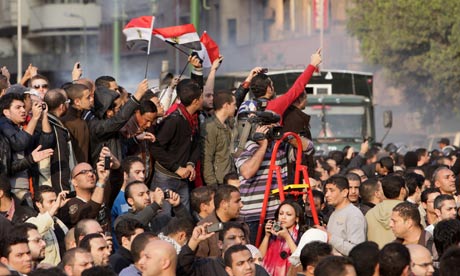 Hazem Kandil is a Ph.D. Candidate in Sociology at UCLA. His work examines state institutions (primarily, the military and security organs) and religious movements, with a special focus on Egypt, Turkey, and Iran. He has taught at the American University in Cairo and has published on the sociology of intellectuals, military sociology, developments in warfare, and international relations. His most recent publication is Islamizing Egypt? Jeff
Hazem Kandil is a Ph.D. Candidate in Sociology at UCLA. His work examines state institutions (primarily, the military and security organs) and religious movements, with a special focus on Egypt, Turkey, and Iran. He has taught at the American University in Cairo and has published on the sociology of intellectuals, military sociology, developments in warfare, and international relations. His most recent publication is Islamizing Egypt? Jeff
It seems that the gap between scholarship and reality remains unbridgeable. Much ink has been spilled on studying Egypt and its political prospects. Most of it seems to have missed the mark. We learned that Egyptian society has been thoroughly Islamized; we read volumes about mosque networks, social welfare circles, identity politics, symbols, rituals, etc. But when Egyptians finally revolted none of this came to play. The demands were non-ideological; the participants were people who never got involved in social or political movements; and the urban heart of the revolt was secular downtown (a neighborhood Islamists never demonstrated in). Again, we were bombarded with articles about cyber movements, social network sites, and the like. Yet when the government shut down the cell-phone and Internet services at the beginning of the turmoil, there was virtually no effect. When asked, many demonstrators had never even heard of Facebook.
Experts warned of the ‘revolt of the poor’, i.e., the starving inhabitants of the inhuman shantytowns that engulf the capital. But spearheading the revolt were the country’s best and brightest. Among them, credit officers, stock market investors, and car dealers (each worth several million pounds), in addition to dozens of actors, pop singers, and other celebrities. Also, nineteenth century doctrines about the passiveness and incurable fatalism that plagues Muslim societies (justifying the ‘democratic exception’) were still circulating when Egyptians were pushing back the men with the black helmets and batons, torching armored vehicles, and mailing tear gas canisters back to sender. Finally, studies warning of the dissolution of social bonds in Egypt, and the absence of modern civil society values failed to explain how doctors formed voluntary medical committees, and fellow citizens set neighborhood watches (to guard against plainclothes police thugs . . .
Read more: Egypt Considered Deliberately
